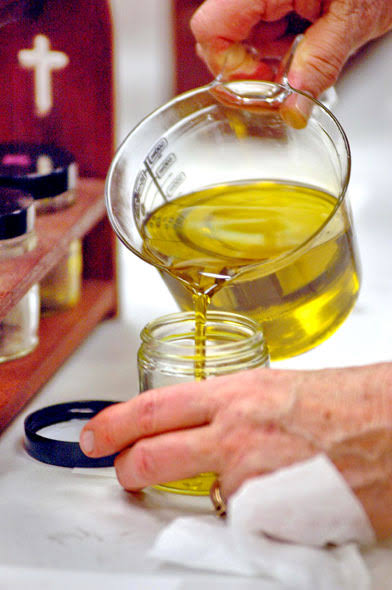Doctrine
What are the 3 oils used in the Catholic Church
In the Catholic Church, there are three types of oil that the priest use in administration of the sacraments. The oils are as follows:
- Oil of the Infirm or sick (“Oleum Infirmorum“)
- Oil of Catechumens (“Oleum Catechumenorum” or “Oleum Sanctorum“)
- Chrism oil (“Sacrum Chrisma“) .
A Chrism mass is celebrated on Holy Thursday, which is when the first two oils are blessed and the Chrism oil is consecrated. The Chrism oil is from the word Christ which means the anointed one of God.
Oil has always been used in the Bible for sanctification, healing, strengthening, beautification, dedication, consecration and sacrifice. In Num11:7-9 the Israelites used it to cook, it was used for fuel in Matt 25:1-9, it was used as healing agent in Lk 10:34.
The Jews used oil to welcome visitors in Lk 7:46 , they also used it to prepare a dead body for burial in Mk16:1. Oil was also used for religious purposes, it was used by Jacob to dedicate a stone in honor of God in Gn 28:18.
The Psalmist also knows the spiritual power of the oil, that’s why he said in Psalm 23:5 “Thou preparest a table before me in the presence of mine enemies: thou anointest my head with oil; my cup runneth over.” and in Psalm 45:7 he said “Thou lovest righteousness, and hatest wickedness: therefore God, thy God, hath anointed thee with the oil of gladness above thy fellows.”
Use of sacramental oils

1. The oil of Catechumen: The oil of Catechumen is a pure olive oil which is used to anoint infants and adults before they are baptized. Before the person is baptized, the Priest anoints the persons chest with oil of Catechumen and says the prayer of exorcism saying “We anoint you with the oil of salvation in the name of Christ our Savior; may He strengthen you with His power, who lives and reigns forever and ever.”
The use of Catechumen before baptism is to help the adult or infant over come the devil, temptations and to give them the power, faith and strength to serve God with their life.
2. Oil of the the Infirm or sick : The oil of the sick is also a pure olive oil used for the sacrament of the anointing of the sick. St James wrote , “Is there anyone sick among you? He should ask for the priests of the church. They in turn are to pray over him, anointing him with oil in the Name of the Lord. This prayer uttered in faith will reclaim the one who is ill, and the Lord will restore him to health. If he has committed any sins, forgiveness will be his”.
The priest anoints the forehead of the sick person and says this prayer “Through this holy anointing, may the Lord in His love and mercy help you with the grace of the Holy Spirit,” and then anointing his hands, says, “May the Lord who frees you from sin, save you and raise you up.”
The sacraments of the sick gives the sick the grace of God to bear the sickness and give them spiritual, emotional and physical healing.
3. Chrism oil : Chrism oil is a mixture of olive oil and aromatic substance called Balsam which represents sweet aroma of Christ. It’s used during Confirmation, Ordination of priest, Consecration of bishop, for consecration of altars and statues or images and Baptism. In Baptism the oil of Catechumen is used before the infant is baptized with water, after being baptized with water he or she is anointed with Chrism oil marking him or her as a Christian.
Chrism oil is used for sanctification and consecration. The Chrism oil is consecrated during the Chrism mass on Holy Thursday, the Bishop breathes into the jar containing the Chrism oil symbolizing the invocation of the Holy Spirit on the Oil just as Jesus breathed upon the apostles telling them to receive the Holy Spirit.

Rite of Chrism mass
The chrism mass is one of the solemn liturgies of Catholic Church, it’s is celebrated annually. The Priest, Bishop and diocesan members gather at the cathedral in the morning of Holy Thursday to celebrate the Chrism mass.
It’s celebrated on Holy Thursday in commemoration of the Last Supper when Jesus told his apostles to do this in memory of me. At the mass the members renew their baptismal vows and the Priest are called to renew their priestly vows.
The mass gets its name from one of the oils which are blessed during the mass. The bishop blesses the oil of the sick and catechumen, he then breathes into the jar containing the Chrism oil and prays the consecration prayer on the Chrism oil. The oils are shared to each parish after they are blessed to be used for the year. This shows the unity of each Parish with the Bishop and the influence of Bishop in all sacraments of the church.
The diocese stores extra oil in a container called Ambry in case a Parish runs out of oil within the year. When the year is over the unused oil is buried or burned during Easter vigil.
About Author
























